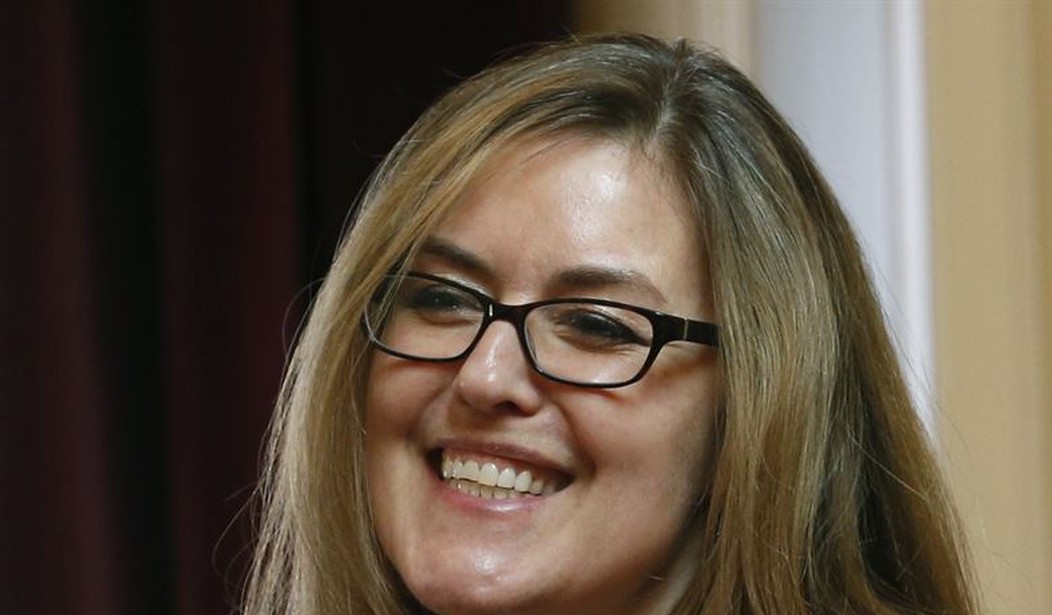In an October 2 debate between candidates for Virginia’s 10th congressional district, incumbent Congresswoman Jennifer Wexton (D) took a position against parents’ rights comparable to the infamous one taken by Terry McAuliffe that led to McAuliffe’s defeat to Glenn Youngkin in Virginia’s 2021 gubernatorial race. Like McAuliffe, Wexton distrusts parents in the upbringing of their own children without the second-guessing of school bureaucrats.
While her opponent Hung Cao (R) steadfastly supported Youngkin’s parents’ rights school policy, Wexton, mirroring McAuliffe, condemned that policy, making clear that she did not trust parents to proceed without a check from school officials on matters of gender identity, alteration in birth genders, and pronoun use. In a tweet preceding the debate, Wexton called Youngkin’s policy “a vile and disgusting attack on vulnerable trans kids.” McAuliffe’s candidacy imploded when he in like manner sided with school administrators over Loudoun County parents. By that metric, if Wexton’s remarks receive the attention they deserve, she might well incur the wrath of parents when the votes are tabulated.
Governor Youngkin’s model policy, issued by Virginia’s Department of Education and entitled “2022 Model Policies on the Privacy, Dignity, and Respect for All Students and Parents in Virginia’s Public School,” insists parents’ rights be protected consistent with constitutional precedent under the Fourteenth Amendment, the Virginia Constitution, and Virginia laws. Although a guidance document and not a statute, it is guidance squarely based on the governing law and it invites further legislative support from Virginia’s General Assembly if and when Republicans take over the state Senate (they already control the House of Delegates). Far from being “vile and disgusting,” it is a commonsense reaffirmation of the equal protection laws that have existed for decades, law radical leftists in the educational establishment have rejected without legal authority so to do in favor of a nihilistic woke agenda foist upon kids without parental consent. Vile and disgusting rightfully describes that radical move to take parents’ rights away, not a move to reaffirm the rights of parents to determine the upbringing of their kids.
Recommended
Despite Wexton’s uneducated criticisms of it, Youngkin’s policy is not at all disparaging of students’ rights, but precisely reflects that balance between parent and student rights required under federal and state Constitutions and Virginia’s statutes. The policy provides that “parents are in the best position to work with their children and, where appropriate, their children’s health care providers to determine what names, nicknames, and/or pronouns, if any, shall be used for their child by teachers and school staff while” at school. It explains that whether a child “engages in any counseling or social transition at school that encourages a gender that differs” from the child’s birth gender is a decision to be left to parents, not made by school officials without informing parents and against parental objections. It demands that schools not “change the legal name or sex in a student or former student’s official record” unless “a parent or eligible student submits a legal document, such as a birth certificate, state- or federal-issued identification, passport, or court order substantiating the student or former student’s change of legal name or sex.” The policy provides that schools may not “conceal material information about a student from the student’s parent, including information related to gender.”
In short, the policy simply demands that schools stop parenting children inconsistent with parents’ desires and respect, uphold and honor those desires instead. There is nothing vile and disgusting about that unless, of course, you take the Marxist view that the nuclear family must be destroyed in favor of an all-powerful paternalistic state. Oh, that’s right, that is precisely the view taken by far left educators.
In addition to Youngkin’s commonsensical protections for parents’ rights over the health and welfare of kids at school, his model policy also prohibits schools from demanding that children adhere to a particular ideology, insisting on the principle of neutrality, thus protecting the First Amendment rights of students to hold their own opinions rather than succumb to school woke indoctrination. It also protects girls and young women from invasion of privacy in bathrooms, by specifying that school lavatories be designated for single use by either male or female genders, likewise for locker rooms. It also protects separation of girls and young women’s athletics from having to include males who identify as girls or young women.
Wexton distinguished herself in the debate with Hung Cao by her condemnation of Youngkin’s policy. She perilously crossed the same line McAuliffe did when she stated that parents could not be trusted to act in the best interests of their children. She said that as a guardian ad litem, she saw “plenty of instances” where “kids who came out as trans were abused by their parents.” She remarked that “in a perfect world we would see parents who are caring and loving and take care of their kids, but we are not seeing that happen in all instances.” Her skepticism about trusting parents to exercise their rights explains her rejection of Youngkin’s model policy. That skepticism, supposedly based on an unspecified number of instances where Wexton observed certain parents’ behavior toward trans kids, is her justification for denying every parent the rights protections to which they are entitled under the United States Constitution, Virginia Constitution, and Virginia statutes. That same kind of skepticism and rejection of parental rights lay at the heart of the McAuliffe debate response which torpedoed his candidacy.
If enough people in Northern Virginia discover the similarities between Wexton’s position and McAuliffe’s, one would think a comparable outcome in the offing.

























Join the conversation as a VIP Member